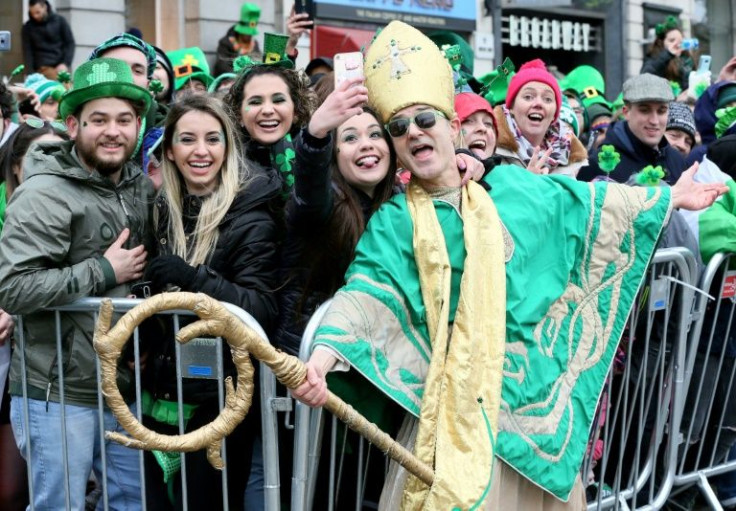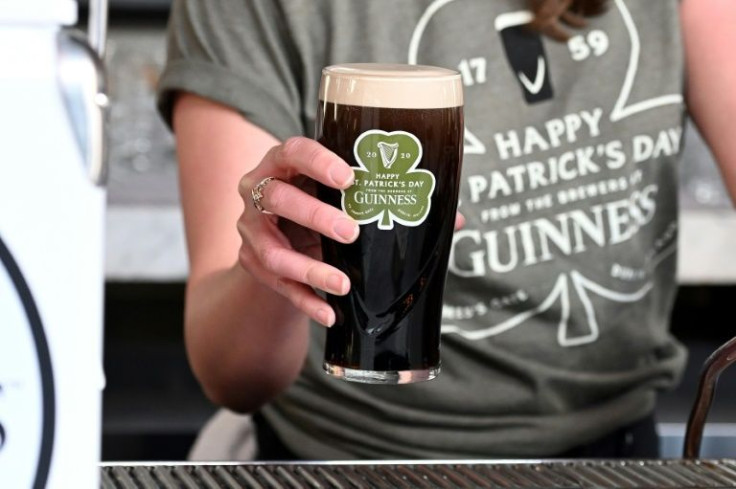St Patrick's Day Parades Return To Ireland After Covid Hiatus
Thousands of participants -- from marching bands to leprechauns -- sang, played and danced through the streets of Dublin on Thursday, as Ireland marked the return of St Patrick's Day after a two-year gap in the celebrations due to coronavirus.
Thousands of Irish and international visitors flocked to the capital Dublin and beyond for the annual celebration of all things Irish, waving flags and in fancy dress.
Events celebrating Ireland's patron saint were some of the first to be called off in 2020 as mass gatherings were shelved, pubs closed and international travel curtailed.

But with the restrictions now lifted, Ireland was ready to party, and the government and organisers of Dublin's giant parade billed this year's event as a symbol of the country's return after Covid.
Government ministers and diplomats have fanned out across Europe and the globe, from Chile to Japan, to renew ties with the Irish diaspora and those of Irish heritage.
Prime Minister Micheal Martin was in Washington to present a bowl of shamrocks to US President Joe Biden, a proud Irish-American who frequently references his family roots in the west of Ireland.

But their meeting had to take place virtually, after Martin tested positive for coronavirus on Wednesday night.
Further afield, there were regular reminders that St Patrick is also a patron saint in Nigeria -- home to a stronger version of Ireland's famous Guinness stout.
The spectre of fresh Covid measures has hung over events in Dublin, where up to 400,000 people were expected to watch 3,000 participants.
The Dublin parade normally takes 18 months to organise.

The go-ahead was only given in January, forcing organisers to work around the clock to make it happen, said festival director Anna McGowan.
"It has been just one of the most intense planning periods I think this festival has ever seen," she told AFP.

Dublin Airport has said it expects 800,000 passengers to travel through in the 12-day St Patrick's Day period from March 12 to March 24.
Nsiidwa Nunu Kambauwa, 29, turned up early for the parade with her sister and five-year-old nephew, their faces painted in the green, white and orange of the Irish tricolour flag.
"I've been here for 10 years and I've never been to the parade, because I'm always working. So today I decided to come up," said Kambauwa, who is originally from Malawi.
"I don't know the rest of the people but I'm too excited because we've been closed.
"Some countries were opening the restaurants or pubs and everything, but we didn't after lock down so I'm kind of really excited to have everything back."
The government declared the celebrations "in solidarity with the people of Ukraine, acknowledging their resilience and courage and assuring them of our unwavering support".
Along the parade route, normally swathed almost entirely in green, lamp-post banners and the bridges over the River Liffey flew the blue and yellow colours of Ukraine.
Hollywood actor John C. Reilly, from Chicago, was appointed international guest of honour -- one of many participants from the United States, to where many Irish emigrated in the 19th and 20th centuries.
At The Temple Bar pub, which shares its name with the buzzing area that contains many of Dublin's most famous watering holes, staff had prepared for the busiest day of the year.
Barman Andrew Roche said that with pubs closed until midday, people would be "loaded up" outside waiting to come in after the parade.
Roche, who had only been working months at the pub when it opened for the last St Patrick's Day, said he expected "the biggest Paddy's day in a long time".
On the day, "There's never a moment where there aren't five taps pouring beer and there's constantly beer going out and money coming in," he said.
© Copyright AFP 2024. All rights reserved.




















